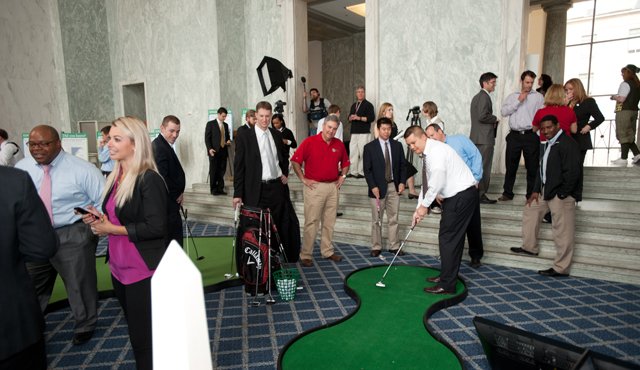Attendees taking part in the We Are Golf exhibit in the Rayburn Foyer during the observance of National Golf Day in Washington, D.C., on Wednesday, April 13th, 2011.
Changing people’s perceptions doesn’t happen in a single meeting – or two or three, for that matter.
The task requires on-going dialogue and education, which explains why a delegation of 85 golf industry executives trekked again to the nation’s capital.
For the fourth consecutive year, they organized “National Golf Day” and met with congressional leaders to help them better grasp golf’s impact on the nation. Their collective message: Far more than just a leisurely pursuit, the sport employs nearly 2 million Americans, spans industries ranging from manufacturing to tourism and features a backbone comprising hundreds of small-business owners, most notably golf course operators.
“We know we have to continually educate members of Congress and their key staff about the economic, environmental and charitable impact of golf,” said Steve Mona, chief executive officer of the World Golf Foundation, who made the trip April 13.
“As different bills come before members, they don’t always connect all the dots back to golf, and an issue that may, in their minds, not be related to golf could in fact be important to us,” Mona said. “We need to be diligent and stay in the fray.”
Among the numerous golf organizations that participated: National Golf Course Owners Association, PGA of America, Club Managers Association of America, Golf Course Superintendents Association of America, Sporting Goods Manufacturers Association and American Society of Golf Course Architects.
Although underscoring golf’s economic impact was a top priority, it wasn’t the only objective of National Golf Day. Organizers also emphasized golf’s societal contributions and charitable work.
For example, Sgt. Ramon Padilla paid tribute to the Salute Military Golf Association, which runs a program that he has used as part of his rehabilitative therapy for wounds suffered in Afghanistan. In addition, PGA Tour commissioner Tim Finchem hosted The First Tee Congressional Breakfast, which briefed legislators on golf’s foremost youth program dedicated to teaching life skills.
The industry delegation, called “We Are Golf,” also made its case that golf facilities should be included in federal disaster-relief legislation. The infamous exclusion of golf from the recovery bill passed in the aftermath of Hurricane Katrina, which devastated the Gulf Coast in 2005, sparked the genesis of what has become the industry’s annual legislative mission.
Jay Goughnour, owner of Raccoon Valley Golf Course in Jefferson, Iowa, shared with lawmakers the challenges he faced after severe flooding in 2008 that destroyed his course.
“I don’t seek pity,” he said. “We will overcome what Mother Nature has dealt us. What I do ask is that golf be given the same status as other small businesses. We deserve the same access to aid and recovery programs that other small businesses have received.”
Gaining inclusion in future relief bills as well as stimulus legislation was a message delivered at virtually every meeting, including those with Congress’ Golf Task Force, Black Caucus and House GOP freshmen. The delegation met with the latter to educate new legislators “before they formed their opinions about our industry,” Mona said.
“Our message seems to be resonating,” he said. “There were several instances when members were citing information we had previously given them.
“I’m pretty confident that based on the conversations that we had, we’ve got several candidates who will (introduce legislation supporting golf). Our intent is to get that back in the hopper sometime this year.”



